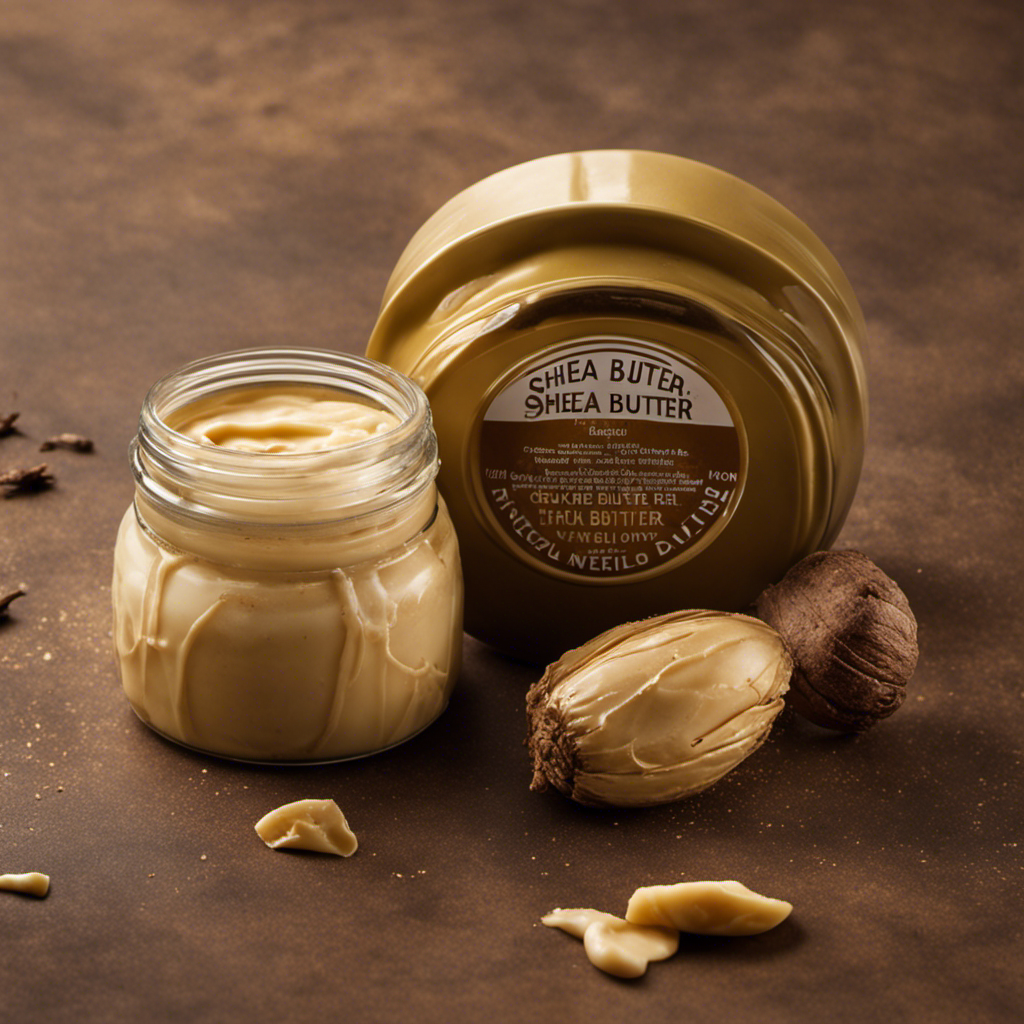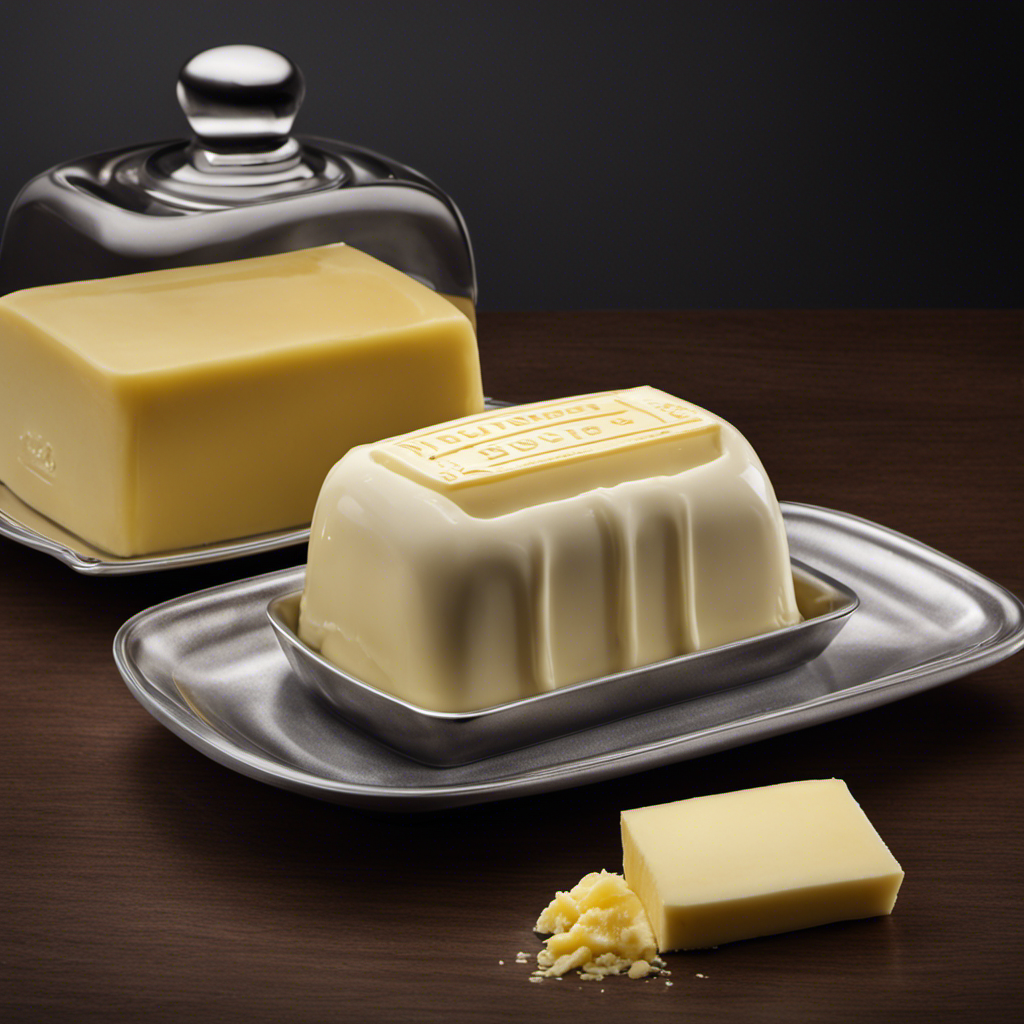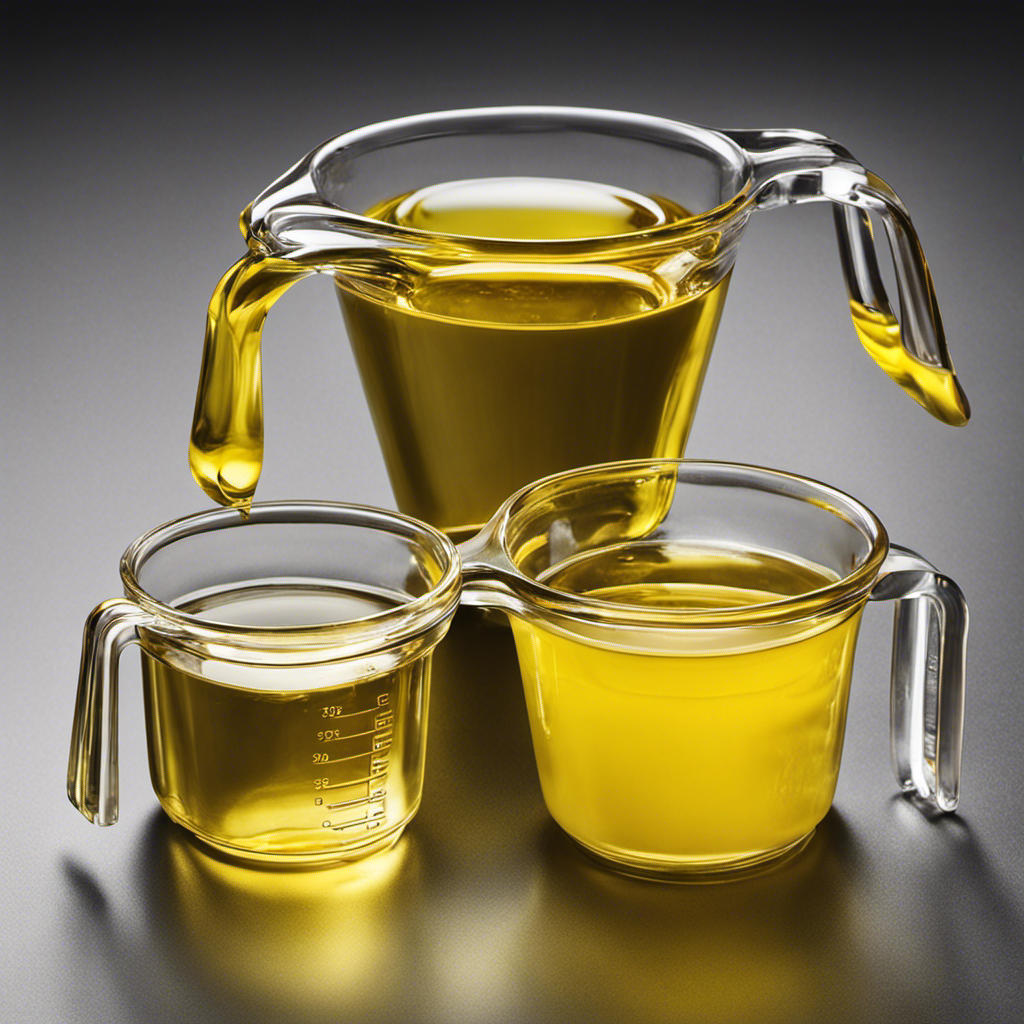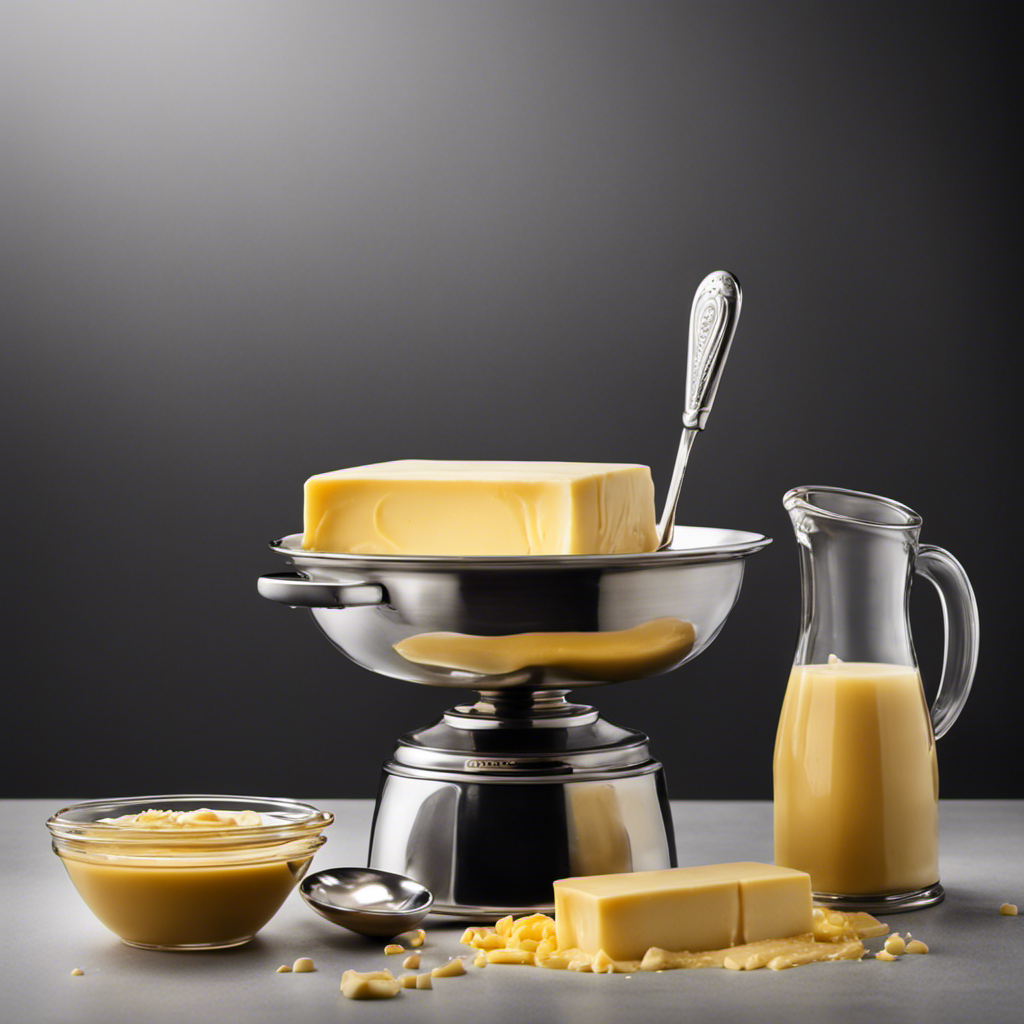Butter Basics
Nutritional Info: How Much Fat Is in a Tablespoon of Butter?
Intrigued by the fat content of butter? Uncover the breakdown of fats in a tablespoon to make informed dietary decisions.

If you're tracking fat intake, a tablespoon of butter has 11.52 grams of fat, 7.294 grams being saturated fat. It's important to monitor your consumption, as butter's 102 calories all come from fat. Butter offers fat-soluble vitamins A, D, and E. Understanding butter's fat breakdown aids informed food choices and saturated fat management.
Key Takeaways
- A tablespoon of butter contains approximately 11.52 grams of fat.
- Saturated fat in butter amounts to 7.294 grams per tablespoon.
- Butter derives all its 102 calories from fat.
- Monitoring fat intake is essential due to butter's high fat content.
- Understanding butter's fat breakdown aids in managing saturated fat intake.
Butter Fat Content Breakdown
In a tablespoon of butter, the fat content can be broken down into approximately 11.52 grams in total. This fat content consists mainly of saturated fat, amounting to about 7.294 grams per serving.
Butter, being a high-fat food, derives all of its 102 calories from its fat component. With a minimal presence of carbohydrates and proteins, butter's nutritional composition is primarily focused on fats.
The saturated fat in butter is a concern for some due to its potential impact on heart health when consumed in excess. Understanding the fat breakdown in butter is essential for those monitoring their fat intake, especially saturated fats.
Despite being a high-calorie and high-fat food, butter can still be enjoyed in moderation as part of a balanced diet. Being mindful of portion sizes and incorporating butter sensibly in meals can help maintain a well-rounded approach to nutrition.
Saturated Fat in Butter

Let's talk about the saturated fat content in butter.
A tablespoon of butter packs around 7.294 grams of saturated fat, making up a significant portion of the daily value.
Managing your intake of saturated fat from butter is important for heart health and overall well-being.
Saturated Fat Content
With approximately 7.3 grams per tablespoon, butter is high in saturated fat content, constituting roughly 70% of its total fat composition.
Saturated fat, found abundantly in butter, has been linked to an increase in LDL cholesterol levels, which is considered the 'bad' cholesterol. It's important to be mindful of the amount of saturated fat consumed, including that from butter, as excessive intake can have negative health implications.
Moderation is key when it comes to incorporating butter into your diet to maintain a healthy balance.
The American Heart Association advises limiting saturated fat intake to help reduce the risk of heart disease. By being conscious of how much butter you use, you can better manage your saturated fat consumption.
While butter adds flavor to dishes, it's vital to be aware of its saturated fat content and make informed choices about its inclusion in your meals.
Health Implications
Considering the saturated fat content in butter, it's important to be mindful of its potential health implications, particularly in relation to heart health. Consuming butter in moderation is pivotal due to its high saturated fat content, which can impact cardiovascular health by potentially increasing LDL cholesterol levels.
It's vital to understand the effects of saturated fats in butter on heart health may vary among individuals, necessitating personalized dietary choices. Research indicates that managing overall fat intake, including saturated fats from butter, is key for maintaining a healthy heart.
- Saturated fats in butter may contribute to increased LDL cholesterol levels.
- Moderation when consuming butter is essential for cardiovascular health.
- Effects of saturated fats in butter on heart health may vary among individuals.
- Understanding the saturated fat content in butter is pivotal for making informed dietary choices.
Dietary Considerations
Mindful consumption of butter is important due to its significant saturated fat content and its potential impact on heart health. A tablespoon of butter contains about 7.3 grams of saturated fat, representing around 36% of the recommended daily intake based on a 2,000 calorie diet.
Saturated fat in butter is known to elevate LDL cholesterol levels, a key risk factor for heart disease. To promote heart health, it's advisable to limit saturated fat intake to less than 13 grams per day, as recommended by the American Heart Association.
Excessive consumption of saturated fat from sources like butter may heighten the risk of cardiovascular diseases. Thus, incorporating butter into your diet in moderation is important for managing saturated fat intake and supporting a healthy heart.
Cholesterol Content in Butter

Butter is an important source of dietary cholesterol, with approximately 31mg of cholesterol found in a tablespoon. This amount contributes to around 10% of the recommended daily intake of cholesterol. It's vital to keep this in mind when incorporating butter into your diet.
Here are some key points to bear in mind regarding the cholesterol content in butter:
- A tablespoon of butter contains about 31mg of cholesterol.
- Cholesterol in butter contributes to 10% of the recommended daily intake.
- Butter is a significant source of dietary cholesterol.
- Moderate consumption of butter can be part of a balanced diet.
Being mindful of your cholesterol intake from sources like butter is necessary, especially if you have specific dietary restrictions or health concerns. While butter can be enjoyed in moderation, it's important to balance your overall nutrient intake for best health.
Vitamin A in Butter

In a tablespoon of butter, you can find approximately 97 micrograms of Vitamin A, providing 11% of the daily recommended value.
Vitamin A in butter plays an important role in supporting various functions in the body, including vision, immune function, and skin health. Butter contains retinol, a form of Vitamin A that's necessary for maintaining healthy eyesight.
The presence of Vitamin A in butter enhances its overall nutritional value, making it beneficial for your health. Consuming butter in moderation can help you meet your Vitamin A needs while enjoying its rich flavor.
Remember that Vitamin A is essential for your eyesight, so including butter in your diet in appropriate amounts can contribute to maintaining good vision and overall well-being. Be mindful of portion sizes to enjoy the benefits of Vitamin A in butter without overdoing it.
Nutritional Value of Butter

With approximately 11.52g of total fat in a tablespoon, butter is a calorie-dense ingredient. This high-fat content contributes to its rich flavor and creamy texture.
Here are some key nutritional aspects of butter:
- Total Fat: A tablespoon of butter contains around 11.52g of total fat, making it a concentrated source of dietary fats.
- Saturated Fat: Butter is high in saturated fat, with approximately 7.294g in a tablespoon. Consuming too much saturated fat can impact cholesterol levels.
- Calories: One tablespoon of butter provides about 102 calories, mostly from its fat content. It's crucial to be mindful of portion sizes when using butter in cooking.
- Fat-Soluble Vitamins: Butter is a natural source of fat-soluble vitamins like A, D, and E, which play essential roles in various bodily functions.
Understanding the nutritional profile of butter can help you make informed choices about incorporating it into your diet while considering your overall fat and calorie intake.
Butter's Caloric Contribution

When considering the caloric contribution of a tablespoon of butter, it is vital to acknowledge its high-fat content. A single tablespoon of butter, weighing around 14 grams, packs approximately 102 calories. This calorie-dense nature stems from the 11.52 grams of total fat it contains, with a significant portion being saturated fat, about 7.294 grams. Incorporating butter into your diet should be done mindfully, as it can easily contribute to your daily fat intake.
To put it into perspective, if you follow a 2000-calorie diet per day, just one tablespoon of butter would already make up more than 5% of your daily caloric intake. Being mindful of how much of this nutrient-dense food you consume is essential, especially if you are looking to manage your weight or are aiming for weight loss.
| Nutrient | Amount per Tablespoon |
|---|---|
| Calories | 102 |
| Total Fat | 11.52g |
| Saturated Fat | 7.294g |
Butter Vs. Butter Substitutes

Butter substitutes like ghee, coconut oil, and olive oil offer distinct flavors and cooking properties compared to traditional butter. When exploring butter alternatives, understanding their unique characteristics and how they can enhance your dishes is crucial.
Here are some key points to keep in mind when choosing between butter and its substitutes:
- Olive oil: Ideal for cooking
- Avocado: Perfect for baking
- Nut butters: Excellent for spreading
- Dietary preferences: Butter substitutes cater to a variety of dietary requirements and can be chosen based on personal tastes and recipe needs.
Whether you desire a rich taste like ghee, a flexible choice like olive oil, or a smooth consistency like nut butters, there are numerous butter substitutes to meet your cooking and baking needs. Trying out different options can introduce a fresh element to your dishes while accommodating diverse dietary preferences.
Health Considerations With Butter

When evaluating its impact on your health, it's vital to take into account the saturated fat and cholesterol content of butter. Butter is renowned for its high saturated fat content, with 1 tablespoon containing approximately 7.3g of saturated fat. This type of fat can potentially influence cholesterol levels since butter also contains around 31mg of cholesterol per tablespoon.
While moderate butter consumption isn't directly linked to heart disease, it's important to be mindful of its saturated fat content in the context of heart health.
The ongoing debate concerning the health effects of butter highlights the significance of integrating it into a balanced diet. Some studies suggest that butter may have neutral impacts on heart health, underscoring the importance of considering overall fat intake and cholesterol levels when incorporating butter into your diet.
To maintain a healthy lifestyle, it's vital to be aware of the saturated fats and cholesterol present in butter and to consume it in moderation as part of a well-rounded diet.
Frequently Asked Questions
How Much Sat Fat Is in 1 Tablespoon of Butter?
In 1 tablespoon of butter, there's about 7.294 grams of saturated fat. It contributes roughly 36% of the daily value. Remember, butter has a higher saturated fat content compared to other fats. Moderation is key!
How Much Fat Is in Butter Compared to Olive Oil?
When comparing butter to olive oil, butter has less total fat at about 11.5 grams per tablespoon, while olive oil contains around 14 grams. It's like choosing between a cozy sweater and a sleek jacket – both serve a purpose, but one is a healthier option for your heart.
Is Butter a Healthy Fat?
Butter can be part of a balanced diet in moderation. Its saturated fat content may affect cholesterol levels. Personal health factors play a role. Enjoy butter mindfully, considering overall dietary choices for best well-being.
Is a Tablespoon of Butter a Day Healthy?
Like a balancing act on a tightrope, having a tablespoon of butter a day can be healthy if it fits your overall diet. Be mindful of saturated fat intake, pair it with nutrient-rich foods, and keep moderation in mind.
Conclusion
So next time you're debating whether or not to use a tablespoon of butter in your recipe, remember that it's not just about the fat content. Butter also provides essential nutrients like vitamin A.
And don't forget, moderation is key! While some may argue that butter is high in saturated fat, remember that it can still be enjoyed as part of a balanced diet.
So go ahead, indulge in that buttery goodness!
Diana’s meticulous nature and editorial prowess set the gold standard for our content. With over a decade in the culinary and publishing industries, her guidance ensures that every article perfectly blends information and entertainment. A culinary experimenter, Diana loves whipping up new butter-based concoctions in her kitchen.
Butter Basics
What if You Buttered Up Your Life with “Butter”?

Have you thought about the idea of making your own delicious and nutritious butter at home? Imagine being able to create that rich, creamy delicacy right in your own kitchen!
In this article, we will delve into the world of butter, exploring its various types and culinary uses. We will also uncover the science behind making perfect butter at home and dive into the fascinating history of this beloved ingredient.
Get ready to embark on a buttery adventure that will leave you craving for more.
Key Takeaways
- Grass-fed butter is rich in essential vitamins and fatty acids, promoting healthy skin, bones, and immune system.
- Homemade butter allows for control over ingredients, avoiding unhealthy additives or preservatives.
- Flavored butter options and vegan alternatives offer diverse culinary exploration and cater to different dietary preferences.
- Proper temperature during the butter-making process is crucial for achieving the desired consistency and yield.
The Health Benefits of Homemade Butter
If you make your own butter, you’ll enjoy the health benefits that come with it. One of the main benefits of grass-fed butter is its high nutrient content. Grass-fed cows produce milk that is rich in vitamins A, D, E, and K. These vitamins are essential for maintaining healthy skin, strong bones, and a properly functioning immune system.
Grass-fed butter also contains a healthy balance of omega-3 and omega-6 fatty acids, which are important for brain health and reducing inflammation in the body.
Additionally, making your own butter at home allows you to control the ingredients, giving you the freedom to create flavored butter using herbs, spices, or even fruits. This allows you to add extra flavor and nutrients to your dishes without relying on store-bought options that may contain unhealthy additives or preservatives.
Exploring Different Types of Butter
There are various types of butter available for exploration. When it comes to flavored butter, the options are endless. From savory garlic butter to sweet cinnamon butter, these variations add a burst of flavor to any dish.
Additionally, for those following a vegan lifestyle, there are plenty of vegan butter alternatives to choose from. Made from plant-based oils like coconut or olive, these spreads provide a similar creamy texture and taste. They are perfect for baking or spreading on toast.
Exploring different types of butter can be a fun and delicious journey, allowing you to elevate your meals and cater to different dietary preferences. So go ahead and indulge in the world of flavored butter and vegan alternatives to discover new and exciting flavors.
Butter as a Culinary Ingredient: Tips and Tricks
To enhance your culinary skills, try incorporating butter into your recipes using these helpful tips and tricks.
Butter is not only a rich and creamy ingredient, but it can also be used as a vegan alternative. For those who follow a plant-based diet, there are several substitutes available such as vegan butter or margarine made from plant oils. These alternatives can be used in baking, cooking, or spreading on toast.
Additionally, using flavored butter can elevate your dishes to a whole new level. Get creative with flavor combinations like garlic and herb butter for roasted vegetables or lemon and dill butter for grilled fish. The possibilities are endless, and flavored butter can add depth and complexity to your favorite recipes.
The Science Behind Making Perfect Butter at Home
Creating homemade butter is a fascinating process that involves churning cream until it separates into butter and buttermilk. The chemistry of churning butter is a delicate balance of fat and water molecules. Temperature plays a crucial role in butter making.
Here are some key points to consider:
- Cream should be at a slightly warmer temperature, around 50-55°F, to ensure proper separation.
- Churning at too low a temperature can result in a longer process and less yield.
- Conversely, churning at too high a temperature can cause the butter to become greasy and not hold its shape well.
- The ideal temperature range allows for the fat globules to coalesce and form a solid mass.
- The process can be accelerated by using colder cream or a colder churning environment.
Understanding the chemistry and temperature requirements of butter making ensures a successful outcome.
Now, let’s uncover the history of butter: from ancient times to today.
Uncovering the History of Butter: From Ancient Times to Today
Let’s delve into the fascinating history of butter, from ancient times to today.
Butter has played a significant role in the cultural traditions of various regions around the world. In Europe, for example, butter has been a staple in cooking and baking for centuries, symbolizing richness and indulgence.
In India, ghee, a form of clarified butter, holds great cultural and religious significance and is used in traditional ceremonies and rituals.
The environmental impact of butter production, however, is a growing concern. The dairy industry contributes to greenhouse gas emissions and deforestation, as well as water pollution from runoff.
Sustainable practices, such as organic farming and reducing food waste, are being implemented to mitigate these effects.
It is crucial to balance the cultural importance of butter with sustainable production methods for a better future.
Frequently Asked Questions
How Many Calories Are in a Serving of Homemade Butter?
A serving of homemade butter typically contains around 100-120 calories. It is important to note that butter is high in saturated fat and should be consumed in moderation. However, it does provide some nutritional benefits, such as being a good source of vitamin A.
What Is the Shelf Life of Homemade Butter?
The shelf life of homemade butter varies depending on storage methods. It can last up to two weeks in the refrigerator and up to six months in the freezer. Proper storage is crucial to maintain its freshness.
Can Homemade Butter Be Used as a Substitute for Margarine in Baking Recipes?
If I were to use homemade butter as a substitute for margarine in baking, I would ensure it’s properly chilled and the moisture content is controlled. This way, the butter can provide a richer flavor and better texture to the baked goods.
Are There Any Potential Allergens in Homemade Butter?
There are potential health risks associated with homemade butter, including the possibility of allergens. It’s important to consider the source of ingredients and proper hygiene practices. Store-bought butter may offer more safety assurances.
Can Homemade Butter Be Frozen for Long-Term Storage?
Yes, you can freeze homemade butter for long-term storage. It’s important to wrap it tightly to prevent freezer burn. There are many homemade butter recipes available online that can guide you through the process.
Conclusion
As I churned the cream, a sense of satisfaction washed over me. The process of making homemade butter had not only given me a delicious spread for my toast, but also a deeper understanding of its health benefits and culinary versatility.
Each rich, golden pat symbolized the nourishment and creativity that butter brings to our lives. Delving into its history, I saw how this humble ingredient has stood the test of time, evolving with us.
So, next time you see a stick of butter, remember the power it holds and the possibilities it offers.
From sneaky childhood butter licks to penning some of our most popular articles, Jamie’s journey with butter has been lifelong. His culinary background gives him a unique perspective, allowing him to craft mouthwatering articles that educate and tantalize equally. Jamie’s travel adventures revolve around finding the world’s best buttery treats when he isn’t writing.
Butter Basics
What Happens if You Use Expired Shea Butter on Your Skin?

As someone who is passionate about taking care of my skin, I have learned the importance of using high-quality products. But what happens if we accidentally use expired shea butter? Let me tell you, the results are not good.
Signs of expired shea butter include changes in texture, loss of nutritional benefits, and potential skin irritation. Plus, there’s a risk of mold or bacteria growth.
In this article, I’ll delve into the potential dangers and safety concerns of using expired shea butter, so you can make informed decisions for your skincare routine.
Key Takeaways
- Using expired shea butter can lead to reduced skin softness and decreased skin elasticity.
- Expired shea butter may cause dry and rough skin, as well as a lack of natural glow.
- There is a potential risk of mold or bacteria growth on expired shea butter, which can result in skin irritations, infections, and allergic reactions.
- To ensure safety and effectiveness, it is important to check the expiration date, store shea butter properly, and avoid using expired products to prevent bacterial or fungal contamination.
Signs of Expired Shea Butter
If you’re wondering how to tell if your shea butter has expired, you can look for changes in texture and smell. Shea butter typically has a shelf life of about two years, but it can start to deteriorate over time.
When shea butter expires, it may become grainy or lumpy instead of smooth and creamy. The texture can be a clear indicator that the shea butter is past its prime. Additionally, the smell of expired shea butter can change, becoming rancid or unpleasant.
It’s important to note that using expired shea butter may not be harmful to your skin, but it may not provide the same beneficial effects as fresh shea butter.
Now, let’s dive into the changes in texture and consistency that can occur when shea butter expires.
Changes in Texture and Consistency
To change the texture and consistency of your expired shea butter, simply store it in a warm environment. When shea butter expires, it can become dry, hard, or grainy. However, by subjecting it to heat, you can bring it back to its original smoothness.
Here are some changes you may notice in the appearance of expired shea butter:
- Loss of its creamy consistency
- Formation of lumps or clumps
- Development of a rancid smell
It’s important to note that expired shea butter may not be as effective as fresh shea butter in providing the same nourishing benefits for your skin. Additionally, the shelf life of shea butter can vary depending on how it is stored. Properly stored shea butter can last up to two years, but exposure to air, heat, and light can shorten its lifespan.
Loss of Nutritional Benefits
When shea butter expires, it loses its nutritional benefits and may not provide the same nourishing effects for your skin. As the expiration date approaches, the effectiveness of shea butter decreases, leading to weakened nourishing properties. The natural vitamins and fatty acids that make shea butter so beneficial gradually break down over time, resulting in a diminished ability to moisturize and protect the skin.
The expiration process causes the shea butter to become less potent, reducing its ability to soothe dryness, heal damaged skin, and improve elasticity. Using expired shea butter may not only be less effective but could also potentially cause skin irritations or allergic reactions.
To ensure maximum benefits, it’s essential to check the expiration date and replace your shea butter when needed.
Potential Skin Irritation
Allergic reactions are possible when using expired shea butter, as the quality and potency of the ingredients may have degraded over time. It is important to note that everyone’s skin reacts differently, so what may cause an allergic reaction in one person may not affect another.
Additionally, expired shea butter can also lead to increased bacterial growth, which can further irritate the skin and potentially cause infections.
Allergic Reactions Possible
Using expired shea butter can potentially cause allergic reactions. It is important to be aware of the potential side effects that can occur when using expired skincare products.
Here are some key points to consider:
-
Skin irritation: Expired shea butter may contain harmful bacteria or mold, which can irritate the skin and cause redness, itching, or rashes.
-
Decreased effectiveness: Over time, shea butter can lose its beneficial properties, such as its moisturizing and healing abilities. Using expired shea butter may not provide the desired results.
-
Risk of infection: Expired shea butter can harbor increased bacterial growth, which can lead to skin infections or other complications.
Therefore, it is crucial to always check the expiration dates on skincare products and avoid using expired shea butter to prevent potential allergic reactions and other negative effects on the skin.
Increased Bacterial Growth
The risk of infection can significantly increase due to the increased bacterial growth in expired shea butter. When shea butter expires, it becomes more susceptible to increased microbial contamination. Bacteria can thrive in expired shea butter, leading to a higher chance of contamination when it is applied to the skin. This increased bacterial growth can pose a serious risk to our health.
Additionally, expired shea butter may also have diminished efficacy. Over time, the beneficial properties of shea butter, such as its moisturizing and healing abilities, can deteriorate, making it less effective in providing the desired results.
It is important to check the expiration date of shea butter before using it to ensure its safety and efficacy.
Decreased Effectiveness for Moisturizing
When shea butter expires, its hydration properties become weakened, resulting in a decreased effectiveness for moisturizing the skin.
Additionally, the nourishing benefits of expired shea butter diminish, causing a loss in its ability to provide essential nutrients to the skin.
As a result, the skin may experience reduced softness and a lack of moisture retention, leading to potential dryness and discomfort.
Weakened Hydration Properties
Expired shea butter may not have its full hydration properties intact. When shea butter expires, it can lead to weakened hydration properties, resulting in decreased moisturizing effectiveness. This means that using expired shea butter on your skin may not provide the same level of hydration and moisture as fresh shea butter.
Here are some emotional responses that may arise from using expired shea butter:
- Frustration: Feeling disappointed that the shea butter you were counting on for hydration is not as effective as expected.
- Discomfort: Experiencing dryness and roughness on your skin due to the weakened hydration properties.
- Wasted effort: Realizing that you have been using expired shea butter and the time and money spent on it have gone to waste.
Using expired shea butter not only results in weakened hydration properties but also leads to a loss of nourishing benefits for your skin.
Loss of Nourishing Benefits
Using expired shea butter can result in a loss of the nourishing benefits it provides to your skin. Shea butter is known for its moisturizing and healing properties, but these qualities diminish over time. The expiration date on the packaging indicates the period during which the shea butter is at its best.
Once it has expired, the butter may start to oxidize and degrade, leading to a decrease in its effectiveness. The nourishing vitamins and fatty acids present in shea butter may become less potent, making it less beneficial for your skin. It’s important to check the expiration date and use fresh shea butter to ensure you are receiving all the nourishing benefits it has to offer.
Reduced Skin Softness
When shea butter expires, not only does it lose its nourishing benefits, but it can also lead to reduced skin softness. Expired shea butter may not provide the same level of hydration and moisture to the skin as fresh shea butter does. This can result in several negative effects on the skin, including reduced skin elasticity and decreased moisturization.
Using expired shea butter can leave your skin feeling dry, rough, and lacking the natural glow it once had. The decreased moisturization can also lead to the development of fine lines and wrinkles, making you appear older than you actually are. To ensure optimal skin softness and health, it is important to use fresh shea butter that hasn’t expired.
Potential Mold or Bacteria Growth
If shea butter is expired, there’s a chance that mold or bacteria could grow on it. Using expired shea butter can pose potential health risks as these microorganisms can cause skin irritations, infections, or allergic reactions. It is crucial to properly store shea butter to maintain its freshness and extend its shelf life. Here are some recommended storage methods to prevent the growth of mold or bacteria:
| Storage Method | Description |
|---|---|
| Keep it sealed | Ensure the shea butter container is tightly sealed after each use to prevent air and moisture from entering, creating an environment conducive to bacterial growth. |
| Store in a cool place | Shea butter should be stored in a cool, dry place away from direct sunlight and heat sources. Elevated temperatures can accelerate the growth of bacteria and mold. |
| Avoid contamination | Do not touch the shea butter directly with your fingers. Instead, use a clean, dry spoon or spatula to scoop out the desired amount to minimize the risk of introducing bacteria. |
Safety Concerns and Allergic Reactions
To avoid potential health risks and allergic reactions, it’s important to check the expiration date of your shea butter and store it properly. Expired shea butter can lead to various skin reactions, such as rashes, itching, and redness. The shelf life of shea butter can vary depending on the processing and storage conditions.
Here are a few key points to keep in mind:
- Expired shea butter may lose its effectiveness and may not provide the desired benefits for your skin.
- Using expired shea butter can increase the risk of bacterial or fungal contamination, which can lead to infections.
- Allergic reactions can occur when using expired shea butter, especially if you have sensitive skin or existing allergies.
To ensure your safety and get the most out of your shea butter, always check the expiration date and store it in a cool, dry place away from direct sunlight.
Frequently Asked Questions
Can Expired Shea Butter Be Harmful if Used on the Skin?
Expired shea butter can be harmful if used on the skin. It may lose its effectiveness for hair care and can cause potential side effects on sensitive skin. It’s important to check the expiration date and avoid using expired products.
How Long Does Shea Butter Usually Last Before It Expires?
Shea butter typically lasts up to two years before it expires. To ensure its longevity, store it in a cool, dry place away from direct sunlight. Signs of expiration include a rancid smell and a change in texture.
Can Using Expired Shea Butter Cause Skin Allergies or Irritation?
Using expired shea butter can potentially cause skin allergies or irritation. It’s important to note that expired skincare products may lose their effectiveness and could harbor harmful bacteria, posing risks to skin health.
Can Expired Shea Butter Still Be Effective for Treating Dry Skin?
Using expired shea butter on hair may not provide the same benefits as fresh shea butter. However, it can still be effective for treating dry skin, including eczema.
Is It Safe to Use Shea Butter That Has Mold or Bacteria Growth on It?
Using shea butter with mold or bacteria growth can pose potential health risks. To prevent this, store shea butter in a clean, airtight container in a cool, dry place. Always check for expiration dates to ensure safety.
Conclusion
In conclusion, using expired shea butter can have negative effects on your skin and overall health. The signs of expired shea butter include changes in texture and consistency, as well as a loss of nutritional benefits. It may also cause potential skin irritation and decrease its effectiveness for moisturizing.
Furthermore, there is a risk of mold or bacteria growth, which can be harmful to your skin. To ensure safety and avoid allergic reactions, it’s important to check the expiration date and use fresh shea butter.
So remember, don’t let your skin suffer, and always use fresh shea butter to keep it nourished and healthy.
Diana’s meticulous nature and editorial prowess set the gold standard for our content. With over a decade in the culinary and publishing industries, her guidance ensures that every article perfectly blends information and entertainment. A culinary experimenter, Diana loves whipping up new butter-based concoctions in her kitchen.
Butter Basics
What Does Indian Butter Chicken Taste Like: A Flavorful Experience

Curious about trying Indian butter chicken? Get ready for a burst of delicious flavors!
This mouthwatering dish is a symphony of traditional Indian flavors, packed with a creamy and rich sauce that will make your taste buds dance with delight.
The combination of aromatic spices creates a perfect balance of sweet and savory, while the tender and juicy chicken takes it to a whole new level.
Get ready to be transported to a world of delectable aromas and flavors that will leave you craving more.
Key Takeaways
- Indian butter chicken embodies the essence of Indian cuisine, combining spices and ingredients from diverse regional variations.
- The creamy and rich sauce in Indian butter chicken creates a symphony of flavors that complement the chicken, leaving you completely satisfied.
- The flavorful spice blend in Indian butter chicken, including spices like cumin, coriander, turmeric, and garam masala, creates a harmonious balance of heat, sweetness, and creaminess.
- The succulent and tender chicken in Indian butter chicken is infused with flavor through the marinade and cooking techniques, enhancing the overall taste of the dish.
Traditional Indian Flavors
If you’re craving traditional Indian flavors, you’ll love the rich and aromatic taste of Indian butter chicken. This dish perfectly embodies the essence of Indian cuisine with its unique blend of spices and ingredients.
Indian butter chicken has been influenced by the diverse regional variations found across India, resulting in a dish that is both familiar and distinct. From the fiery flavors of North Indian cuisine to the subtle and delicate tastes of South Indian cuisine, every bite of butter chicken is a journey through the diverse culinary landscape of India.
The combination of tender chicken, marinated in a flavorful blend of spices and cooked in a creamy and rich sauce, creates a harmonious balance of flavors that will leave you craving for more.
Creamy and Rich Sauce
Get ready to indulge in a culinary experience like no other with this discussion on the flavorful spice blend and succulent chicken pieces that make up this mouthwatering dish.
The aroma of the spices will instantly transport you to the bustling streets of India, while the tender chicken pieces will melt in your mouth, leaving you craving for more.
Each bite is a symphony of flavors, with the spices perfectly complementing the juicy chicken, creating a harmonious blend that will leave you completely satisfied.
Flavorful Spice Blend
You’ll love the flavorful spice blend in Indian butter chicken. This popular Indian dish is known for its aromatic and rich taste, thanks to the spice-infused marinade.
The combination of spices like cumin, coriander, turmeric, and garam masala creates a symphony of flavors that will tantalize your taste buds. The marinade not only adds depth to the chicken but also helps to tenderize it, resulting in succulent and juicy pieces of meat.
As the chicken cooks in the creamy and buttery tomato sauce, the flavors meld together, creating a harmonious balance of heat, sweetness, and creaminess. The spices add a subtle kick that is not overpowering but still provides a delightful warmth.
Get ready to savor the explosion of flavors in every bite as the succulent chicken pieces are coated in the fragrant and spiced sauce.
Succulent Chicken Pieces
The succulent chicken pieces become incredibly tender as they cook in the creamy tomato sauce. The juicy marinade penetrates the meat, infusing it with a burst of flavor. The chicken takes on a rich, savory taste that is enhanced by the spices and herbs in the marinade.
The cooking techniques used in Indian butter chicken are essential in achieving the perfect texture and taste. The chicken is first marinated in a mixture of yogurt, lemon juice, and various spices for several hours. This allows the flavors to develop and tenderize the meat.
Then, the chicken is cooked in a buttery tomato sauce, allowing it to absorb the creamy goodness. The result is a dish that is succulent and full of flavor, with the chicken practically melting in your mouth.
Mouthwatering Spices
Experience the explosion of flavors in each bite as the mouthwatering spices in Indian butter chicken tantalize your taste buds. Indian butter chicken is known for its sensational flavor combination and tantalizing aroma that will leave you craving for more. The rich and creamy tomato-based sauce is infused with a blend of aromatic spices, creating a harmonious balance of heat and tanginess. The use of spices like cumin, coriander, turmeric, and garam masala adds depth and complexity to the dish. The tender chicken pieces are marinated in a yogurt-based marinade, which helps to tenderize the meat and enhance the flavors. Each bite is a burst of flavors, with the spices dancing on your palate and leaving a lingering warmth. It is a culinary experience that is truly unforgettable.
| Flavor | Description |
|---|---|
| Spicy | The spices in Indian butter chicken add a kick of heat, creating a satisfying spicy flavor. |
| Tangy | The tomato-based sauce provides a tangy and slightly acidic taste that balances out the spices. |
| Creamy | The richness of the creamy sauce adds a smooth and velvety texture to the dish. |
Perfect Balance of Sweet and Savory
Now that we’ve explored the mouthwatering spices that make up Indian butter chicken, let’s dive into its perfect balance of sweet and savory flavors. When you take that first bite, you’ll be greeted with a symphony of tastes that will leave you craving for more.
The sweet and tangy notes dance on your tongue, creating a delightful explosion of flavors. The complex flavor profile of Indian butter chicken is a result of the carefully selected spices, such as garam masala, fenugreek leaves, and yogurt, which all come together to create a harmonious blend.
The sweetness comes from the caramelized onions and the richness of the cream, while the tanginess is provided by the tomato-based gravy. This combination creates a dish that is both comforting and exciting, making Indian butter chicken a true culinary masterpiece.
Tender and Juicy Chicken
When you take that first bite, you’ll be amazed by how tender and juicy the chicken in Indian butter chicken is. The succulent pieces of chicken are perfectly cooked, with a melt-in-your-mouth texture that is truly satisfying.
The flavors seep into every crevice of the meat, creating a taste explosion in your mouth. The chicken is marinated in a blend of aromatic spices, yogurt, and lemon juice, which not only tenderizes the meat but also infuses it with a myriad of delicious flavors.
As you chew, you can taste the subtle hints of cumin, coriander, and garam masala, along with the rich creaminess of the buttery tomato sauce. The combination of tender chicken and juicy flavors is what makes Indian butter chicken a true culinary delight.
Aromatic and Fragrant Dish
When it comes to Indian butter chicken, you’re in for a flavor explosion. The bold flavors and spices used in this dish will tantalize your taste buds and leave you craving for more.
The creamy tomato-based sauce adds a luscious and rich element to the dish, perfectly complementing the succulent and tender chicken.
Trust me, once you try this dish, you won’t be able to get enough of its delectable combination of flavors and textures.
Bold Flavors and Spices
Bold flavors and spices are what give Indian butter chicken its distinct taste. This classic dish is known for its explosion of flavors that will tantalize your taste buds. The combination of traditional spices like cumin, coriander, and garam masala creates a rich and aromatic profile that is truly unforgettable. The use of these bold flavors elevates the dish to a whole new level, making it a favorite among Indian food enthusiasts. The table below highlights some of the key spices used in Indian butter chicken:
| Spice | Flavor Profile |
|---|---|
| Cumin | Earthy and nutty |
| Coriander | Citrusy and floral |
| Garam Masala | Warm and pungent |
These spices work harmoniously together, creating a symphony of flavors that will make your taste buds dance. As you indulge in the bold flavors of Indian butter chicken, you’ll soon discover why it has become a beloved dish worldwide. And while the spices play a crucial role in its taste, it’s the creamy tomato-based sauce that takes this dish to the next level. [Transition to subsequent section: ‘creamy tomato-based sauce’]
Creamy Tomato-Based Sauce
The creamy tomato-based sauce in Indian butter chicken is what adds a luscious and velvety texture to the dish. This sauce is made by simmering tomatoes, onions, garlic, ginger, and a blend of aromatic spices such as cumin, coriander, and turmeric. The result is a rich and flavorful sauce that coats the tender pieces of chicken, infusing them with a burst of Indian spices.
The creaminess comes from the addition of butter and cream, which adds a luxurious and indulgent touch to the dish. The combination of the tangy tomatoes, aromatic spices, and creamy texture creates a harmonious balance of flavors.
Indian butter chicken is a beloved dish in Indian cuisine, known for its rich, comforting, and satisfying taste.
Succulent, Tender Chicken
The succulent, tender chicken in this dish is cooked to perfection, resulting in a melt-in-your-mouth texture that is incredibly satisfying.
The marinated chicken is packed with flavor, infusing every bite with a burst of aromatic spices.
The juicy meat is so tender that it practically falls off the bone, making it a delight to eat.
The marinade adds an extra layer of richness, ensuring that each piece of chicken is well-seasoned and packed with deliciousness.
The cooking process seals in the moisture, resulting in a juicy and succulent texture that is hard to resist.
Whether you’re a fan of chicken or not, this dish will captivate your taste buds and leave you craving for more.
Conclusion
So, now you know what Indian butter chicken tastes like! It’s a culinary delight that combines the traditional flavors of India with a creamy and rich sauce. The mouthwatering spices create a perfect balance of sweet and savory, making every bite a treat for your taste buds.
The tender and juicy chicken adds a satisfying texture to the dish. And let’s not forget about the aromatic and fragrant aroma that fills the air when this dish is being prepared. In fact, did you know that butter chicken is one of the most popular Indian dishes worldwide? It’s no surprise considering its irresistible flavors and delightful combination of ingredients.
So why not give it a try and experience the magic of Indian butter chicken for yourself?
Diana’s meticulous nature and editorial prowess set the gold standard for our content. With over a decade in the culinary and publishing industries, her guidance ensures that every article perfectly blends information and entertainment. A culinary experimenter, Diana loves whipping up new butter-based concoctions in her kitchen.
-

 Recipes & Culinary Uses2 months ago
Recipes & Culinary Uses2 months agoHow Many Sticks of Butter Equals a Pound: A Handy Guide
-

 Shopping Guides1 month ago
Shopping Guides1 month agoWhere to Buy Raw Butter
-

 Recipes & Culinary Uses4 weeks ago
Recipes & Culinary Uses4 weeks agoMake Homemade Butter from Milk at Home
-

 Recipes & Culinary Uses4 weeks ago
Recipes & Culinary Uses4 weeks agoMake Creamy Butter From Buttermilk
-

 Butter Tips and Tricks3 months ago
Butter Tips and Tricks3 months agoHow Long Can You Use Butter After the Expiration Date?
-

 Recipes & Culinary Uses2 months ago
Recipes & Culinary Uses2 months agoMake Your Own Homemade Spray Butter
-

 Butter Tips and Tricks3 months ago
Butter Tips and Tricks3 months agoHow Much Butter to Use Instead of 1/3 Cup Oil
-

 Butter Tips and Tricks3 months ago
Butter Tips and Tricks3 months agoHow Many Calories Are in a Stick of Butter: A Comprehensive Guide


















